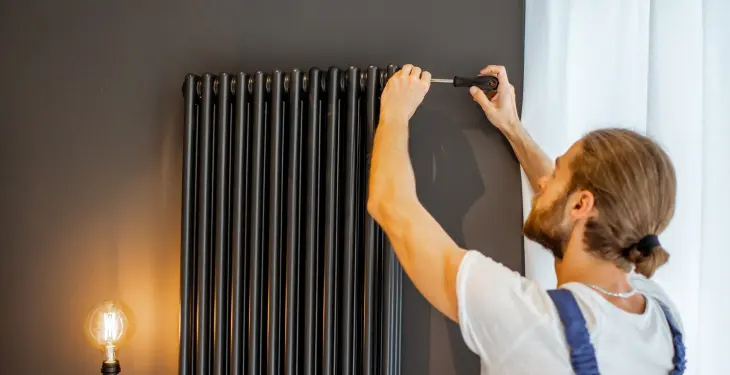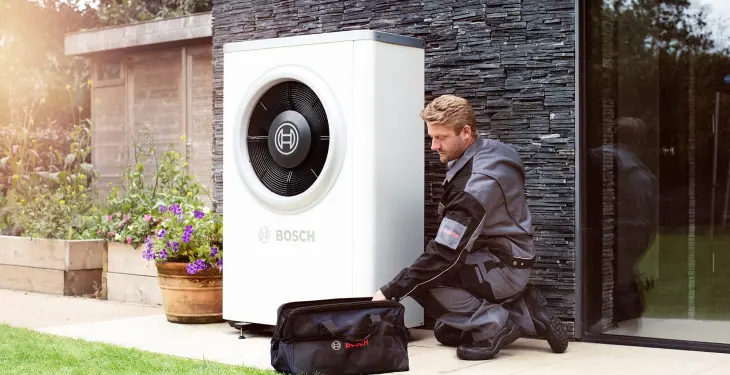

Written by Stephen Day
Gas Safe Engineer
Updated: 12th August, 2025
The Boiler Upgrade Scheme is a pivotal initiative aimed at supporting the decarbonisation of heat in homes and non-domestic buildings across England and Wales.
Get a new boiler quote, save up to £550 per year (0% APR available).
The Boiler Upgrade Scheme, introduced by the UK government, represents a strategic initiative to accelerate the transition towards low-carbon heating solutions in England and Wales. It offers property owners financial support for replacing older, fossil-fuel-based heating systems with more sustainable options such as heat pumps and biomass boilers.
This move not only tackles the pressing issue of carbon emissions but also encourages green investments in domestic and non-domestic buildings. In 2025, the scheme aligns with the country's broader environmental targets, underscoring the commitment to reducing the carbon footprint of the residential heat sector.
Understanding the nuances of the Boiler Upgrade Scheme is essential for homeowners and landlords considering an eco-friendly overhaul of their heating systems. The scheme provides grants that significantly reduce the initial cost, which has historically been a barrier to widespread adoption of these technologies.
Eligibility criteria and the application process are straightforward, ensuring that qualified installations proceed efficiently and comply with the necessary standards. Additionally, the scheme complements other government measures aimed at enhancing overall energy efficiency in homes.
Get a quote in 60 seconds, fitted as fast as next day!
0% APR finance available.
The Boiler Upgrade Scheme is a pivotal initiative aimed at supporting the decarbonisation of heat in homes and non-domestic buildings across England and Wales. It addresses the ambitious environmental targets of achieving net-zero emissions through financial incentives.
The scheme was launched with a clear mission: to contribute significantly to the UK’s decarbonisation efforts. Aiming to reduce the reliance on fossil fuels, the Boiler Upgrade Scheme provides grants for the adoption of low-carbon heating systems such as heat pumps and biomass boilers. This effort directly supports the broader Net Zero goal by diminishing carbon footprints and enhancing air quality.
In 2025, the scheme has seen insightful updates to bolster its effectiveness:
Grants of up to £7,500: Homeowners can receive substantial financial assistance to offset the costs of upgrading their boiler systems.
Extended Coverage: It now includes a wider array of eligible properties, helping more residents in England and Wales to participate.
Installer Support: There is an emphasis on providing support to the supply chain, ensuring that installers are well-equipped to manage the increased demand for low-carbon heating solutions.
The focus stays firmly on sustainability and energy efficiency, promoting substantial upgrades that align with the UK's environmental commitments.
The Boiler Upgrade Scheme provides a financial incentive to property owners looking to enhance the energy efficiency of their homes through the installation of low-carbon heating systems. Specific conditions must be met to apply, and a clear application process is followed to secure funding.
To be eligible for the Boiler Upgrade Scheme, several criteria must be adhered to:
The property in question must be located in England or Wales.
Applicants must be property owners or authorised tenants.
The property must have an installation capacity not exceeding 45 kilowatts.
Existing heating systems must be fossil fuel-based.
Energy performance certificates must exhibit no outstanding recommendations for loft or cavity wall insulation.
The application process is straightforward:
Find an accredited installer: Property owners should engage with a Microgeneration Certification Scheme (MCS) certified installer or an equivalent.
Obtain a quote: An official quote for the heat pump or biomass boiler installation is necessary.
Complete the application: With the installer's guidance, the homeowner uses the quote to complete an online application for the scheme.
Receive the voucher: If the application is successful, a voucher is issued as a commitment to provide the grant.
Upon receipt, the voucher remains valid for the following periods:
Air source heat pump and biomass boiler: The voucher stays valid for three months.
Ground source heat pump: A voucher has a six-month validity period.
After installation is completed within these time frames, the installer redeems the voucher and the grant is paid directly to them. The property owner benefits from a subsidy on the total cost, culminating in an efficient, greener heating system at home.
The Boiler Upgrade Scheme (BUS) targets a transition to low carbon heating systems. It offers financial support for several sustainable heating solutions, ensuring households can make environmentally conscious upgrades.
Air source heat pumps (ASHPs), one of the key technologies supported by the scheme, offer a grant of £7,500 to help cover installation costs. These pumps absorb heat from the air outside to warm the home, functioning efficiently despite external temperatures.
The sustainable impact of ground source heat pumps (GSHPs), which utilise natural heat from underground, is recognised with the same grant amount as ASHPs. The BUS provides £7,500 towards both the cost and installation of GSHPs, assisting homes in reducing carbon footprints.
Similar to ground source systems, water source heat pumps (WSHPs) draw heat from water bodies. Depending on local geography, WSHPs may be an option. The grant for water source heat pumps equals that of other types of heat pumps in the BUS, at £7,500.
Biomass boilers are eligible for a grant in limited circumstances, particularly in rural areas without access to the gas grid. The scheme sets aside £5,000 towards the fitting and purchase of biomass boilers; however, this is restricted to safeguard against area-specific environmental impacts.
In 2025, The Boiler Upgrade Scheme continues to provide homeowners and businesses with essential financial support for transitioning to more sustainable heating systems, like heat pumps and biomass boilers.
The Scheme offers grant funding which significantly offsets the initial expense of installing low-carbon heating technologies. Successful applicants receive vouchers that must be redeemed by the installer post-installation.
Despite the generous grants, there's an upfront cost to consider, as these grants rarely cover the full price of the new heating system. However, capital grants alleviate the financial burden and stimulate the market by making energy efficiency upgrades more accessible. They aim to reduce the impact of the upfront cost, therefore making it feasible for individuals to invest in renewable heat solutions.
New heating systems can influence a property's market value. Installations under the Boiler Upgrade Scheme could lead to long-term savings on energy bills and potentially enhance the property's desirability. It's an investment that not only optimises the energy efficiency of a building but may also contribute to a future-proofed, more valuable asset.
In the UK's Boiler Upgrade Scheme, the installation and certification are crucial milestones. They ensure systems are safely installed by competent professionals and meet stringent criteria for efficiency and performance.
Criteria for Selecting an Installer:
Certified by the Microgeneration Certification Scheme (MCS)
Proven experience with heat pump or biomass boiler installations
Prior to commissioning any installation work, it is imperative to engage an installer who is MCS certified. MCS certification denotes that the installer adheres to the industry's highest standards for quality and technical competence. Homeowners should solicit quotations from multiple installers to compare proficiency and rates.
Stages of Commissioning:
Pre-Installation Checks: Assessment of existing heating system and energy needs
Installation: Adhering to manufacturer's specifications and MCS guidelines
Testing: Verification of correct installation and operational efficiency
Once installation is underway, an MCS-accredited installer will undertake the commissioning process. This process is the systematic sequence of steps to assure that the heat pump or biomass boiler is installed correctly and performs according to the desired specifications. Upon completion of this process, the system should be fully functional and ready for use.
Purpose: To certify installers and equipment for small-scale renewable energy technologies
Benefits: Assurance of high-quality installations and eligibility for government incentives
The Microgeneration Certification Scheme (MCS) is a nationally recognised quality assurance platform. It provides certification for both products and installation services for small-scale renewable energy technologies, which is a fundamental requirement for accessing the financial incentives offered by the Boiler Upgrade Scheme. Adherence to the MCS standard is non-negotiable for both the installer and the equipment to ensure compliance and performance are up to par.
Upgrading to a more efficient heating system is only part of the journey towards a greener, more energy-efficient home. Complementary measures, such as improving home insulation, are essential to maximise energy savings and enhance the overall performance of new heating technologies.
Loft Insulation enhances a home’s thermal efficiency by minimising heat loss through the roof. Cavity Wall Insulation acts similarly, by filling the gap between the outer and inner walls, which prevents heat from escaping. Both measures are fundamental in retaining the heat generated by eco-friendly boilers, making the installation of either type an effective starting point before embarking upon more significant heating system upgrades.
An Energy Performance Certificate (EPC) rates a property's energy use and provides recommendations for improvement. It's a vital document that gives homeowners insight into their property's energy efficiency and identifies specific measures to reduce energy consumption. The EPC's role extends to the Boiler Upgrade Scheme, where proof of a valid certificate is often a requisite, ensuring that all upgrades align with the broader goal of increased energy efficiency.
Choosing between a modern gas boiler and alternative heating systems hinges on several home-specific factors. Here are key considerations to determine if a modern gas boiler is the more suitable option:
Existing Infrastructure: Homes with current gas central heating systems might find a modern gas boiler upgrade to be less intrusive and more cost-effective in the short term. Retrofitting a property for a low-carbon heating system can be complex and expensive.
Property Type: Smaller homes, particularly flats with limited outdoor space, may struggle to accommodate the outside unit of a heat pump. In such scenarios, a compact gas boiler could be a more viable solution.
Insulation Levels: If a home is not well-insulated, heat pumps may not perform as efficiently. Modern gas boilers can still operate effectively in poorly insulated homes, though insulation improvements are always recommended.
Gas Availability: Properties located in areas without access to the gas grid might find alternatives like heat pumps or biomass boilers to be more appropriate. Conversely, homes already connected to the gas grid can easily upgrade to a modern gas boiler.
Budget Constraints: Installation of a low-carbon heating system is generally more expensive upfront, despite long-term savings and potential government grants. Households facing budget constraints may opt for a modern gas boiler due to lower immediate costs.
Homes with these characteristics may find modern gas boilers a fitting choice. However, considering the UK's carbon reduction targets, it is advisable to also explore long-term sustainability and potential financial support for transitioning to greener alternatives.
Boilers can be a daunting purchase for many people as they’re an appliance with a lot of responsibility, providing heat for you and your family is something you want to get right. Boilers aren’t exactly a quickly disposable item either, potentially lasting you a decade.
Effectively, new boiler cost can be split into two segments: the first is the actual boiler itself (unit price), and the second is the cost of the boiler being installed (set up) in your property by an expert engineer.
Here at iHeat, we want to remove all of this undue stress and make the decision making process of upgrading to a new central heating system, as easy as possible.
Boiler costs can vary depending on a number of factors including their brand, model, fuel, output, warranty, labour and installation type. Typically a new boiler will cost between £1,845 and £3,500, below is a list of average boiler installations offered by iHeat (guide only).
Installation Type | Price (inc VAT) | |
Combi to combi swap | £1,845 | |
System to combi conversion | £2,499 | |
New boiler install | £2,899 | |
Back boiler to a combi | £3,299 | |
System to system | £1,945 |
Last updated: 12th August, 2025

Written by Stephen Day
Gas Safe Engineer at iHeat
Stephen Day is a Gas Safe registered and FGAS certified engineer with over 20 years of hands-on experience in the heating, cooling, and renewable energy industry, specialising in boiler installations, air conditioning, and heat pump systems.
LinkedInArticles by Stephen Day are reviewed by iHeat’s technical team to ensure accuracy and reliability.

14th November, 2025
A boiler power flush in the UK typically costs £300 to £600. It’s a one-time cleaning that...
 Read Article
Read Article

14th November, 2025
The Clean Heat Market Mechanism is a UK policy making boiler manufacturers sell more heat...
 Read Article
Read Article

12th November, 2025
If your Alpha boiler is showing an error code, this guide explains what each one means, wh...
 Read Article
Read Article
No obligation. Takes less than 60 seconds.